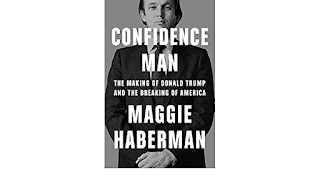So Maggie Haberman's aptly titled biography of The Former Guy is about to drop, and they're teasing it, as is the custom, with a sample scabrous anecdote—how Trump clogged White House toilets with the bits of torn-up official documents, as if the cops were knocking and he was getting rid of his stash of coke. So what's got everybody riled up? This new evidence of Trump's knowing, continuous violation of the Presidential Records Act? Hell no, everybody's mad at Maggie for presumably waiting till now to publish the story so she could cash in on it.
Everybody, that is, except some old bloggers:
Maybe there would have been hearings - maybe even an impeachment. But he would have skated, with unanimous or near-unanimous Republican support. So withholding the story had no effective impact.
— Steve M. (@nomoremister) February 10, 2022
Now we know why he was so obsessed with water-saving toilets. It wasn't about flushing shit, it was about flushing criminal evidence pic.twitter.com/dt33u7kroU
— Against Yastronomical Odds (@Yastreblyansky) February 10, 2022
Right. And Omarosa reported that he ate at least one document.https://t.co/1Phsvka0IY
— Steve M. (@nomoremister) February 10, 2022
He committed crimes in broad daylight every day, and all the newspapers and all but one of the cable channels reported them. They just refused to call them crimes. It's not about selling books, it's about belonging to the Church of Savvy and taking the View from Nowhere.
— Against Yastronomical Odds (@Yastreblyansky) February 10, 2022
Thing I'd totally forgotten, from that post--the staffers who taped the documents together were FIRED pic.twitter.com/vqczp6RIYh
— Against Yastronomical Odds (@Yastreblyansky) February 10, 2022
Same for Dept of Interior files on endangered species, offshore drilling inspections and the safety of drinking water. Or Jared Kushner making official communications with MBS using the self-erasing WhatsApp. Or.........
— Against Yastronomical Odds (@Yastreblyansky) February 10, 2022
Haberman doesn't seem to be a very nice person (at least on Twitter, where, to be sure, few of us are at out best), and I have some questions about her ethics; not about whether she holds back some delicious morsel in the hope of making more money off of it at a later date, but about the degree to which she indulges in what they call source-greasing, of people like the "two individuals close to the president" who often seem to be Jared and Ivanka, on whom I think she may have written puff pieces in return for exclusive information.
But one thing I will keep saying about her is that she's a damned good writer (a profession many non-nice people have followed throughout the history of journalism), and one of the ways her quality shows is in the selection of incidents and quotes in a given story, for the most insightful effect. You can't just organize all your notes into paragraphs and publish the whole thing—you have to pick and choose and arrange, and I think that's the main concern in where she chooses to use a particular anecdote, in a news story or an analytic piece or a book. I'm saying her choices are artistic, and revealing of her characters' character.
So much of what I understand of Trump's personality disorder is what I learned from her, even though she never called it a personality disorder. Somebody bigger than us should have called it a personality disorder—somebody in The New Yorker or The Atlantic, maybe—but it didn't necessarily have to be her.
And the same goes for the criminality. It wasn't on Haberman's list of responsibilities to call Trump a criminal. Her job was to paint a picture of him criming, which she did really excellently, and investigative reporters, working with court papers and financial records and the like, rather than interviewing the court ladies-and-gentlemen-in-waiting, were the ones who should have named the crimes, and I think they really let us down, they and their editors—even the brilliant David Fahrenthold at Washington Post, even the superb Times team (David Barstow, Susanne Craig, and Russ Buettner) who worked through the Trump family finances and gave us Mary Trump, never really communicated that they were exposing money laundering, bribery, fraud, and the rest.
We had all the information we needed. Comey and Mueller had enough information to jail him, though I suppose Mueller was under some really appalling pressure, especially after the advent of Bully Billy Barr. The Senate Intelligence Committee had vast information, and published it in a thousand-page book, but nobody studied it, and none of it made a difference. And if Haberman, or Michael Wolff, or even Woodward and Costa hadn't held anything back, that wouldn't have made a difference either, I'm afraid.
What we didn't have was a willingness on the part of the gatekeepers in the press, or the criminal justice system, to acknowledge that the situation went beyond a he said–she said controversy, and that we were being governed by outlaws. And now it seems the loss was incalculable.

No comments:
Post a Comment